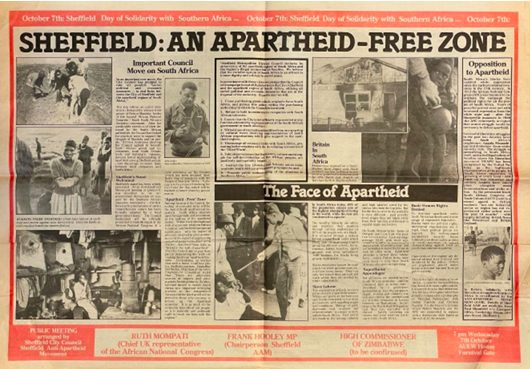For 8 days two Palestinian women camped outside the Town Hall supported by many hundred of Sheffield people – who came to visit or stay with them throughout the day and night. They had three clear demands. The one demand in our grasp at a local level is that the council declare Sheffield an Israeli Apartheid Free zone and take action to ensure none of its operations can have ties with Israel.
[What can you do? Find out here]
It is fantastic that in this great city the pressure from a wide range of communities and workers for the council to do this continues. And now, with the ruling from the International Court of Justice which explicitly stated that it was plausible Israel had committed genocidal acts, it is surely time for the council to take a stand.

This must be at a minimum, a formal statement, very similar to the one it made in 1981 about South Africa declaring Israel an Apartheid state and Sheffield an Apartheid Free Zone. What does this mean? In 1981 there were specific actions the council said it would take laid out in eight points. These are listed below (Israel replaces South Africa in the text) :
1. Cease purchasing goods that originate from Israeli within the purchasing authorities in which the council is involved.
2. Refuse to hold investments in companies with Israeli interests.
3. Ensure that the Council is not officially represented at any function attended by the Israeli government or trade missions.
4. Withold use of recreational facilities from any sporting or cultural event involving representatives of Israeli organisations which give support to the South African regime.
5. Discourage all economic links with Israel, promoting better relations with the developing economies of the Third World.
6. Take steps to ensure that the history, culture and struggle for self-determination of Palestinian people are positively and equitably taught.
7. Instruct the city Libraries and Schools not to make available Israeli government propaganda and
8. Promote public understanding of the situation in Israel.
Unless we do this as a city, we remain silent. Unless we do this as a city, we remain complicit. Unless we do this as a city, we are forgetting Sheffield’s great tradition of protest and solidarity – from the sugar boycott in the 1850s to solidarity with Chilean refugees in the late 1970s and South African anti apartheid campaign in the 1980s.

